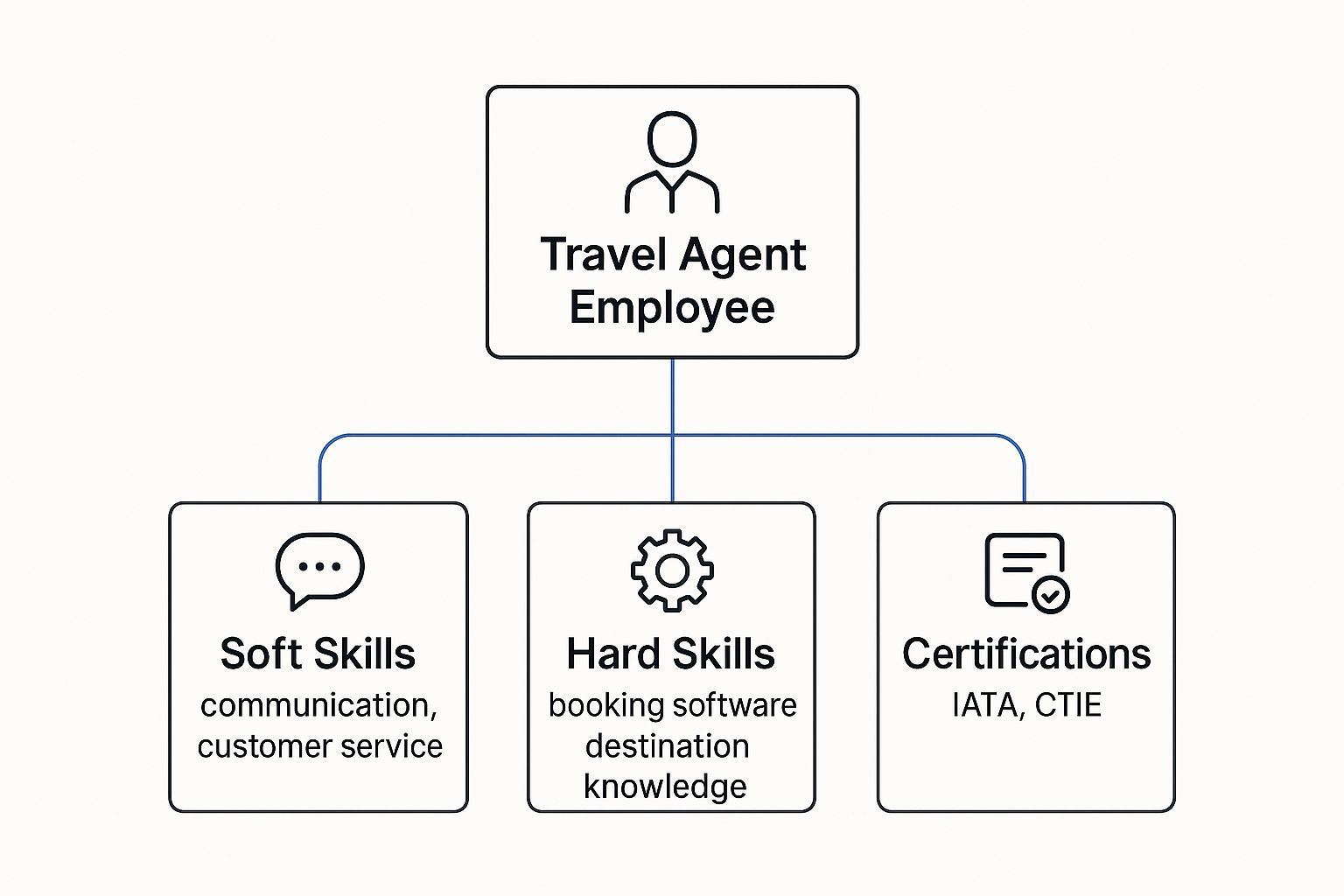Your Guide for Travel Agent Employees
- Aug 12, 2025
- 13 min read
Working as a travel agent is about so much more than just booking incredible holidays for your clients. It's a career with its own unique financial landscape, full of specific opportunities and obligations. To really thrive, you need a solid grasp of your income structure, how commissions work, and the specific tax deductions you can claim to look after your own financial wellbeing.
Your Financial Roadmap as a Travel Agent Employee

Welcome! Think of this article as your essential guide to navigating the financial side of your profession here in Australia. We're going to walk through everything you need to know, from making sense of your payslip and the Travel Services Award to uncovering every single tax deduction you’re entitled to claim.
Planning your finances is a lot like mapping out a complex, multi-destination itinerary. You have to know your starting point (your income), figure out the best route (your expenses and deductions), and have a clear final destination in mind (a healthy financial future). We're here to give you the expert insights to help you chart that course with confidence.
The Australian Travel Industry Landscape
The role of a travel agent is absolutely vital to Australia's tourism sector. The latest data shows there are around 26,929 people employed in Travel Agency and Tour Arrangement Services across the country. And while that number has seen a small dip recently, the industry has still managed a compound annual growth rate of 4.1% over the last five years. It just goes to show how resilient and important the sector is.
Part of optimising your finances as a travel agent means dealing with international transactions. Getting the best value is crucial, so it’s worth understanding the basics of comparing foreign currency exchange rates to help manage these moving parts.
In such a dynamic field, staying on top of your financial rights and responsibilities isn't just good practice—it's essential for building a secure and rewarding career.
This guide is all about empowering you. We want you to feel confident managing your taxes and making smart financial choices. We'll break down the tricky topics into simple, actionable steps, giving you all the tools you need for tax time and beyond.
Let's start building your financial foundation.
To get started, here’s a quick overview of the key financial areas you should be aware of as a travel agent employee. Think of it as your pre-flight checklist before we dive deeper into each topic.
Quick Financial Checklist for Travel Agents
Key Area | What You Need to Know |
|---|---|
Your Payslip | Understand the difference between your base salary and commission payments. |
The Travel Award | Know your rights and minimum entitlements under the Travel Services Award. |
Tax Deductions | Keep records for all work-related expenses, from famils to home office costs. |
Superannuation | Ensure your employer is paying the correct super on all your earnings, including commissions. |
Record Keeping | A solid system for receipts and documents is non-negotiable for maximising your tax return. |
This table covers the fundamentals, but the real value comes from understanding the details behind each point. In the following sections, we’ll explore each of these areas to ensure you’re not leaving any money on the table.
Understanding Your Income and Payslip
For travel agent employees, figuring out your income isn't as simple as looking at a single salary figure. Your total pay is usually a mix of different parts, and each one has its own tax implications. Getting a handle on these components is the first step to managing your finances effectively and making sure you're paid what you're owed.
Your income usually kicks off with a base salary or wage – that's your regular, guaranteed pay. But on top of that, many travel agents earn commissions from sales and bonuses for hitting performance targets. It’s absolutely crucial to remember that the Australian Taxation Office (ATO) sees all of this—salary, commissions, and bonuses—as taxable income.
This infographic breaks down the key skills and qualifications that are essential for a successful career as a Travel Agent Employee.

As you can see, it's a blend of soft skills, technical know-how, and formal certifications that really makes a competent travel professional stand out.
Decoding Your Payslip
Under Australian law, your payslip has to list these different income streams separately. It should clearly show your gross pay (your total earnings before any deductions) and your net pay (what you actually take home). Always double-check that your employer is correctly withholding tax (known as PAYG withholding) from all your earnings, including those commissions. This simple check can save you from a nasty surprise tax bill at the end of the financial year.
Key Insight: Don't just give your payslip a quick glance. Really scrutinise it. Make sure your base pay, commissions, super contributions, and the tax withheld all line up with your employment agreement and the relevant award.
The demographics of tourism and travel advisers in Australia show a pretty unique workforce. A massive 78% of these professionals are female, which is far higher than the 48% average across all jobs. The median age is 44, and with 75% working full-time, it's clear the role requires serious commitment.
The Travel Services Award
Most travel agent employees in Australia fall under the Travel Services Award. Think of this as the rulebook that sets the minimum pay rates, overtime rules, penalty rates, and allowances you are legally entitled to.
Key things covered in the award include:
Minimum weekly wages, which are based on your classification level and experience.
Allowances for things like uniforms, meals, or using your personal car for work.
Overtime and penalty rates for any work you do outside standard hours, on weekends, or on public holidays.
Knowing where you sit within the Award’s classification structure is vital. It’s how you confirm you’re getting the right pay and entitlements. This knowledge also helps you spot potential tax deductions. For example, any work-related costs you pay for that aren't reimbursed by your employer—like specialised training—could be claimable. You can learn more in our complete guide to claiming individual tax deductions.
Claiming Every Tax Deduction You Deserve

As a travel agent employee, your job comes with a unique set of expenses that many other professionals simply don't have. Getting the best possible tax return isn't about finding sneaky loopholes; it’s about knowing what you’re entitled to and methodically claiming every legitimate work-related expense. This is where a little bit of planning goes a long way.
To claim any deduction, you first need to meet three non-negotiable "golden rules" set by the Australian Taxation Office (ATO). Getting these right is the foundation of a solid, compliant tax return.
The Three Golden Rules of Tax Deductions
For any expense you want to claim, you must be able to answer "yes" to all three of these questions:
Did you spend the money yourself? The expense had to come out of your own pocket, and you weren't reimbursed by your employer for it.
Is it directly related to your job? There must be a clear and direct connection between the expense and earning your income as a travel agent.
Do you have a record to prove it? You need proof. This means keeping receipts, invoices, or bank statements.
Think of these rules like a pre-departure checklist before you lodge your tax return. If you can tick all three boxes for an expense, you’re cleared for takeoff. If not, it's best to leave that claim on the ground to avoid any turbulence with the ATO later on.
Common Deductions for Travel Agent Employees
With those rules firmly in mind, let's dive into some of the most common tax-deductible expenses that travel agent employees can often claim.
Self-Education and Professional DevelopmentThe travel industry is always changing, with new destinations, products, and booking systems popping up all the time. If you undertake study or training directly related to your current job—and it's likely to help you earn more—you can claim the costs.
This could include things like:
Course fees for learning new booking software or getting a destination specialisation.
The cost of attending industry seminars, conferences, or workshops.
Travel and accommodation expenses if you had to travel away from home for a course.
Work-Related Subscriptions and FeesStaying on top of industry trends is a huge part of your role. You can claim the cost of subscriptions to trade magazines, industry publications, and the annual fees for your union or professional associations.
Work-From-Home ExpensesIf you work from home, even just for a few hours a week, you might be able to claim a portion of your running expenses. The ATO offers specific methods for this, like the fixed rate method, which covers costs like electricity, gas, internet, and the decline in value of your home office furniture.
Uniform and Car Expenses
Uniforms and Protective ClothingYou can claim the cost of buying, renting, or repairing a compulsory uniform that clearly features your employer's logo. You generally can't, however, claim the cost of conventional clothing, even if your boss asks you to wear a specific colour or style (like a black skirt and white shirt).
Car ExpensesDo you use your personal car for work? This doesn't mean your daily commute. We're talking about work-related travel, like visiting clients, attending off-site training, or travelling between different agency branches. If so, you can claim the running costs. To do this accurately, you'll need to either keep a logbook or use the cents per kilometre method. Remember, your normal trip between home and your main workplace is considered private travel and can't be claimed.
Navigating these rules ensures you are prepared. For a step-by-step walkthrough of the entire process, you can find more details in our guide on how to file your taxes in Australia.
Common Tax Mistakes to Avoid This Year
Knowing what you can claim is only half the battle. Lodging your tax return correctly is just as important, and for travel agent employees, a few common slip-ups can attract unwanted attention from the Australian Taxation Office (ATO), potentially leading to audits and penalties.
The ATO keeps a close eye on industries with high levels of work-related travel and education expenses, which puts the tourism sector squarely in its focus. Understanding these frequent errors is the best way to make tax time a stress-free experience.
Blurring the Lines Between Work and Private Travel
This is one of the biggest red flags for the ATO. It’s easy to get wrong, especially with familiarisation trips, or 'famils'. While these trips are a vital part of your job, any private portion is not deductible.
Think of it this way: if a famil is five days long but you decide to stay for a personal holiday for an extra two days, you can only claim expenses for those five work-related days. You absolutely must be able to prove the main purpose of the trip was for work. Meticulous records are non-negotiable here.
Keep a detailed travel diary noting your daily work activities.
Hold onto all itineraries, meeting schedules, and any correspondence from your employer about the trip.
Split the costs accurately between the work and private parts of your trip.
Miscalculating Work-From-Home Deductions
With many travel agents now working from home, this deduction is a hot spot for mistakes. A common error is claiming expenses without a proper dedicated home office space or, more often, failing to correctly calculate the hours you actually worked from home.
If you use the ATO's fixed-rate method, you must keep a record of the total number of hours you work from home for the entire income year.
It’s not enough to just guess your hours. The ATO needs a complete record—like a timesheet, roster, or a diary kept for the full year—to back up your claim. Forgetting this can make your entire claim invalid.
Failing to Keep Adequate Records
This is the mistake that trips everyone up. Without good proof, even a perfectly legitimate expense can be denied by the ATO. A credit card statement shows you spent money, but it doesn't prove what you bought or that it was for work.
A quick checklist to run through before you lodge:
Have I kept all my receipts? This means everything from uniforms and self-education to industry subscriptions.
Is my logbook up to date? If you're claiming car expenses, a logbook is essential for proving your work-related kilometres.
Can I prove the work-related portion? For mixed-use expenses like your phone bill, you need records showing exactly how you calculated the work percentage.
Getting these things right is crucial for a smooth tax season. While these tips are geared towards travel professionals, the core principles apply across many fields. For example, our guide on tax deductions for tradies also drills down on just how critical it is to keep detailed, accurate records.
Building Your Long-Term Financial Future

Smart financial planning is about more than just your yearly tax return. For anyone working as a travel agent, building a secure financial future means getting serious about your superannuation. This is especially true in an industry that can be quite sensitive to economic ups and downs. Think of your super as your retirement nest egg—managing it proactively is one of the best financial decisions you can make.
Under Australian law, your employer must contribute a percentage of your ordinary time earnings into your super fund. This is called the Superannuation Guarantee (SG). It's a good habit to regularly check your payslips and super statements to make sure these payments are being made correctly and on time.
Maximising Your Superannuation
Just relying on the SG is a decent start, but if you want to really grow your retirement savings, you’ll need to do a bit more. Making extra voluntary contributions is a powerful way to boost your super balance over time, all thanks to the magic of compound earnings.
Here are two common ways to do it:
Voluntary Concessional Contributions (Salary Sacrificing): This is where you arrange with your employer to pay a portion of your pre-tax salary straight into your super. It’s a win-win: you lower your taxable income for the year and grow your retirement savings at the same time.
Voluntary Non-Concessional Contributions: These are simply contributions you make from your after-tax income. You don't get a tax deduction for them, but they’re still a fantastic way to build up your super balance.
Key Takeaway: Think of your super as a long-term investment in your future self. Even small, regular contributions now can snowball into a substantial sum by the time you retire, giving you the financial freedom and security you deserve.
The tourism sector can be volatile. Recent Australian data showed that while overall tourism employment grew, travel agency services specifically saw a 7.2% job decrease in a single quarter, likely due to shifts in how people book their holidays. This really highlights why it’s so important for travel agent employees to build a solid financial safety net.
Figuring out the best way to manage your nest egg is crucial. Our team can help you map out a financial plan that aligns with your career, and you can get a head start by learning more about how to check and grow your super balance. For travel agent employees who are serious about securing their financial future, looking into professional retirement planning services can also provide invaluable guidance and support.
How a Tax Specialist Can Help You
Navigating the tax landscape for travel agent employees can get surprisingly tricky. While getting your head around payslips, deductions, and super is a great first step, partnering with a tax specialist is the best way to make sure no detail is missed and you’re fully compliant with the ATO.
Think of a tax agent as an expert local guide for your finances. You might know the main tourist spots, but they know the hidden laneways—those niche deductions and strategies that lead to a much better outcome.
They can help you structure claims for famil trips, correctly portion out your work-from-home expenses, and ensure every last commission payment is accounted for. This professional oversight is your best protection against accidental mistakes that could attract an ATO review.
Maximising Your Return with Expert Guidance
A specialist does more than just fill out forms. They offer strategic advice that’s fine-tuned for your profession. They understand the specific quirks of the Travel Services Award and can spot opportunities you might have otherwise missed. This proactive approach ensures you're not just compliant, but you’re also setting yourself up for a stronger financial position this year and in the future.
The core ideas of keeping good records and understanding industry-specific deductions apply across many fields. For example, our guide for construction employees also shows how vital professional advice is for maximising returns in a specialised job. The same logic applies directly to your role in the travel industry.
Bringing in an expert saves you time and gives you peace of mind, letting you focus on what you do best—creating amazing travel experiences for your clients. Let us handle the tax complexities to ensure you get back every dollar you're entitled to.
Frequently Asked Questions
When you're a travel agent employee, navigating the tax world can feel a bit tricky. We get asked the same questions all the time, so we've put together some clear, straightforward answers to help you get it right and feel confident about your finances.
Can I Claim My Entire Familiarisation Trip as a Deduction?
This is easily one of the most common points of confusion. The short answer is no, not usually. The rule is simple: you can only claim the portion of the trip that is directly for work.
Imagine your employer sends you on a five-day ‘famil’ trip. If you decide to add a two-day personal holiday at the end, you can only claim expenses for those five work days. The Australian Taxation Office (ATO) needs to see that the main reason for the trip was to earn your income. This makes meticulous record-keeping non-negotiable. A detailed travel diary showing your daily work activities is the best way to prove your claim and separate out any private spending.
What Records Do I Absolutely Need for Deductions?
Having a legitimate claim denied simply because of poor paperwork is a frustrating (and avoidable) outcome. For every single deduction, you must have proof.
Here are the absolute essentials:
Tax Invoices and Receipts: These must clearly show what you bought, the supplier's details, the amount paid, and the date.
Travel Diary: A must-have for any overnight work travel, especially 'famils'. You need to detail what you did each day.
Logbook: If you're claiming car expenses using the logbook method, you'll need a logbook covering a continuous 12-week period to establish your work-use percentage.
Phone and Internet Bills: You need to keep records that show how you worked out the percentage of your usage that was for work.
A quick heads-up: a credit card statement on its own isn't enough for the ATO. It proves you spent money, but it doesn't explain why it was a work-related purchase.
How Is Commission Income Taxed?
Think of your commission just like your regular salary. It’s all considered part of your assessable income. Your employer is required to withhold tax (PAYG Withholding) from your commission payments, exactly as they do with your base wage.
It's a really good idea to check your payslips regularly. Make sure tax is being withheld from all your earnings—both salary and commission—to avoid a nasty surprise with a tax debt at the end of the financial year.
At Baron Tax & Accounting, we specialise in helping travel industry professionals navigate these exact questions. Our team is here to make sure you claim every dollar you're entitled to while staying on the right side of the ATO.
• Need assistance?
We offer free online consultations:
– LINE: barontax
– WhatsApp: 0490 925 969
– Email: info@baronaccounting.com
– Or use the live chat on our website at www.baronaccounting.com
📌 Curious about your tax refund? Try our free calculator:👉 www.baronaccounting.com/tax-estimate
For more resources and expert tax insights, visit our homepage:🌐 www.baronaccounting.com

Comments